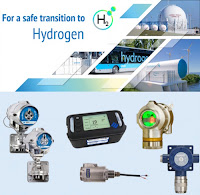Teledyne Gas and Flame Detection’s innovative fixed and portable systems have been ensuring the safe use of hydrogen for decades, with the company today providing a critical contribution to a safe and efficient energy transition. Products, systems and services are available to support the full hydrogen spectrum – production, distribution and storage – across a host of established and new applications. In addition, a wide range of sensors is available for the main gases in the hydrogen value chain, including methane, ammonia, carbon monoxide and carbon dioxide. Many are suitable for integration into SIL2 or SIL3 systems.
Fixed gas detectors.
A case in point is the highly successful DG7-SIL2 intelligent fixed gas detector with integral display, which is ideal for detecting hydrogen and other gases related to hydrogen and hydrogen derivatives. This microprocessor-driven instrument is fully configurable using a wireless hand-held terminal or a hard-wired HART option, providing true flexibility to the installer and reduced service costs. The unit can interface directly with a wide range of panels, controllers and PLCs.
Another attractive option in fixed gas detectors is the OLCT 100-SIL2, which offers a range of housings and sensors for the full hydrogen value chain. It comes with a 4-20mA output and carries SIL certification in accordance with EN 50402.
Part of the same product family, the compact OLCT 20 fixed gas detector is ideal for installation in shelters or on skids, where there is a need for monitoring in very small spaces or for on-board applications. These transmitters again provide a 4-20mA output with the potential for direct connection to PLCs.
Flame detectors.
Many customers ask if they can use their existing natural gas flame detector with hydrogen. However, many flame detection systems for use in hydrocarbon processing just ‘see’ combustion products such as water, soot or carbon dioxide. When pure hydrogen burns it forms only water, making it necessary to use special flame detection equipment.
Teledyne GFD has an exciting new offer in this area: the Spyglass IR3-H2-V flame detector quickly detects hydrogen and other ‘energy transition’ fires in support of rapid response efforts. A near-infrared camera provides personnel with the ability to see invisible hydrogen flames in all weather and light conditions. Notably, the detector automatically records video, providing additional means to study the cause and development of fires.
For building networks of wired or wireless gas and flame detection equipment to enable integrated site safety strategies, it will be necessary to employ a controller. Here, the Teledyne GFD modular and flexible MX62-SIL2 features a large, fully interactive 10" (up to 15") high-definition colour touchscreen, 64 secure channels and a back-up processor to ensure continual measurement.
Portable gas leak detectors.
Portable gas detection equipment is perfect for use by personnel working in locations where compressed hydrogen is present and may potentially leak. Hydrogen has a wide flammability range in air: from 4% to 74% at atmospheric pressure. To ensure safety at all times, Teledyne Gas and Flame Detection portable gas detection systems have an alarm at 50% of the LEL, or 2% hydrogen.
Among the latest developments is the versatile GS700-Hydrogen, an upgraded version of the company’s popular and successful Gasurveyor 700 (GS700) that adds the ability to detect hydrogen. The new ATEX-certified GS700-Hydrogen therefore offers both natural gas and hydrogen detection in a single instrument. Ideal for leak detection around major equipment, large sites, and pipeline installation and maintenance, the GS700 has an optional GPS mapping system. It is possible to store and process data from the field in Teledyne GDCloud software to map the location of measured data and pinpoint the geo-location of any leaks. The device, which offers exceptional flexibility and performance in all gas utility applications, has already seen adoption at several hydrogen network test sites.
Personal safety gas monitors.
Teledyne Gas and Flame Detection can offer a comprehensive range of wearable devices for monitoring hydrogen, ammonia and all major gases relating to the hydrogen value chain. For example, the PS200 four-gas compliance monitor is compact, lightweight, water resistant and extremely robust, while the larger PS500 model provides the potential to detect up to five gases.
Ultimately there will be many roads to the hydrogen economy based on decarbonisation and new applications. And while some harbour concerns about hydrogen’s tiny molecules that can leak through the smallest of cracks, Teledyne GFD has the expertise and solutions to render hydrogen a very ordinary gas. The company has been working with customers for decades to ensure the safety of personnel and assets when handling hydrogen. Today, a complete portfolio of hydrogen gas and flame detection systems from Teledyne Gas and Flame Detection is ready to empower a safe and efficient transition to the hydrogen economy.
@mepaxIntPR #Teledyne #PAuto #Safety




















No comments:
Post a Comment